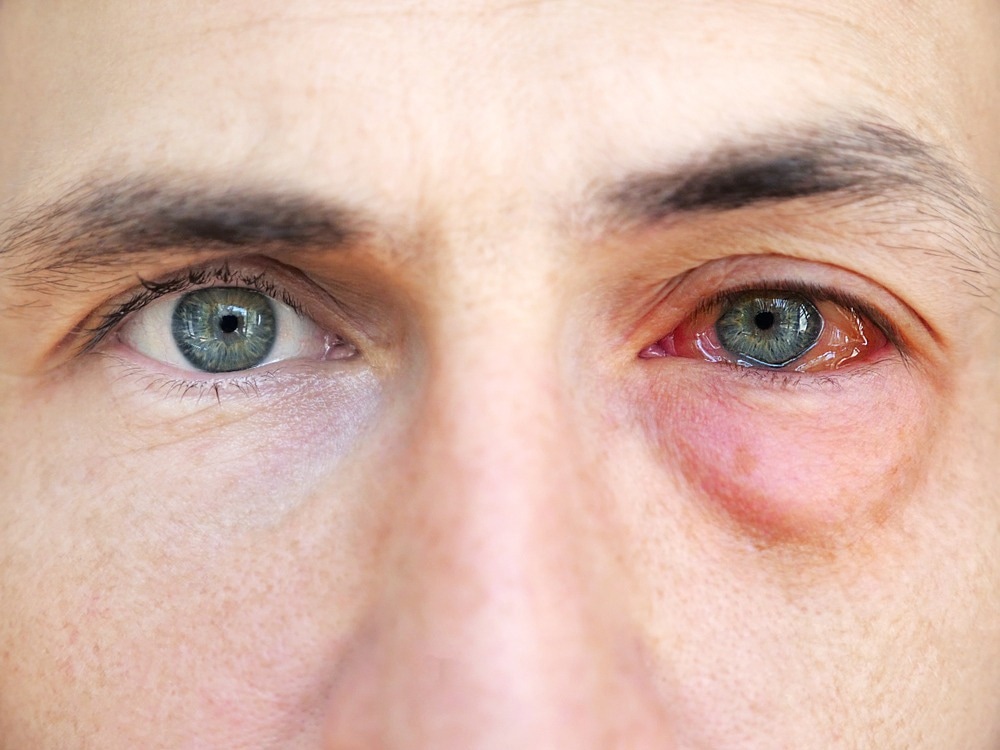In a recent article published in IDCases, researchers review the clinical symptoms, diagnosis, and treatment of ocular Mpox syndrome in men living with human immunodeficiency syndrome (HIV) infection. This crucial information can help clinicians identify such vision-threatening infections early and initiate prompt treatment.
 Study: Ocular MPox: A Report of Two Cases. Image Credit: katushOK / Shutterstock.com
Study: Ocular MPox: A Report of Two Cases. Image Credit: katushOK / Shutterstock.com
Case report: Patient 1
The case report described the medical manifestations of a 28-year-old male patient with controlled HIV infection. The patient reported pain in his left eye, which was accompanied by redness and diminished visual acuity for the past six weeks.
Despite treatment with topical cyclopentolate, erythromycin, and valacyclovir, his ocular disease progressed and ultimately resulted in vision loss within one week. The patient could only perceive light and hand motion and sought admission to a hospital.
Medical history
The patient received treatment for syphilis in the past; however, his HIV infection was being managed through emtricitabine-rilpivirine-tenofovir alafenamide treatment. Before developing ocular symptoms, the patient reported a rash on his right shoulders and lower back, as well as an ulcerative lesion on his penis.
The patient was sexually active with another man but denied having traveled recently, receiving a Mpox vaccine, or previous exposure to Mpox-infected individuals.
Medical examination and treatment
The physical examination of the patient showed conjunctival erythema with corneal scarring in the left eye. While visual acuity in the right eye was 20/20, it was limited to hand motion in the left eye, which had an intraocular pressure of 35 mm Hg, as indicated by tonometry. Examination of the left eye through the slit lamp method also revealed keratolysis with corneal stromal keratitis.
The corneal swab tested positive for orthopoxvirus (Opox) through the real-time polymerase chain reaction (RT-PCR) assay. The patient was subsequently prescribed 600 mg of tecovirimat (TPOXX) orally two times a day, in addition to topical ocular trifluridine.
One week of treatment with tecovirimat improved the patient’s keratitis and ulceration. However, his vision and photophobia did not improve, even after completing a 30-day course of these medications.
Case report: Patient 2
The second case report described the medical manifestations of a 36-year-old HIV-infected male who presented with pain in the right eye. The patient also reported redness in his eyes, blurry vision, and water-like discharge for one month.
Medical history
Omics eBook

The patient had a history of previously being treated for latent tuberculosis and syphilis. His medical records showed he was evaluated for a facial rash, during which a facial swab was obtained, and subsequently tested positive for Opox. The patient’s facial lesions resolved within one week.
Medical examination and treatment
The ophthalmic examination indicated mild right eyelid edema and conjunctivitis, as well as stromal keratitis and corneal ulcer. Despite topical moxifloxacin and oral valacyclovir treatment, the patient’s condition did not improve.
HIV treatment with bictegravir-emtricitabine-tenofovir was subsequently initiated. Additionally, the patient was prescribed oral tecovirimat for 30 days, which resolved some of his symptoms, including photosensitivity and eye pain, but did not improve his vision.
A corneal swab obtained on admission tested positive via RT-PCR for Opox. Topical treatment with ocular trifluridine, tobramycin, and prednisolone led to a negative RT-PCR result for Opox on a corneal swab obtained four weeks later.
Important considerations
Ocular Mpox, which is a rare indicator of prior acute MPox infection, has been identified in 1% of cases. Unfortunately, the two patients described in this study suffered from devastating vision-threatening complications due to ocular MPox with keratitis.
While early complications, such as conjunctivitis, are relatively mild and resolve over time, late and serious complications, such as corneal ulcerations and keratitis, may lead to visual impairment and vision loss.
Cutaneous lesions suggest the presence of ocular Mpox infection; thus, doctors should not overlook these symptoms during ophthalmic examinations. Furthermore, RT-PCR testing of corneal swabs is essential to confirm acute ocular Mpox.
Since untreated HIV infection severely suppresses the immune system, thereby contributing to worse outcomes, patient 2 suffered from persistent unresolved symptoms. This emphasizes the importance of quickly initiating antiretroviral therapy for such patients, in addition to assessing them for possible bacterial, viral, or fungal co-infections.
Any patient with suspected ocular Mpox should first be given systemic antiviral therapy, such as TPOXX, which is now available for treating severe Mpox infections under the new drug protocol of the United States Centers for Disease Control and Prevention (CDC).
Another important step to preventing ocular Mpox is counseling patients to avoid unintentionally inoculating the virus into their eyes. This should include hand hygiene practices and refrain from using contact lenses.
More data is needed on the infectiousness of ocular MPox. Both patients' swabs in the current study consistently tested positive for Opox, suggesting that this infection might be persistent. Thus, it is imperative to practice infection control precautions, including patient isolation and environmental disinfection.
- Source: Bhamray-Sanchez, D., Dever, L. L., & Chew, D. (2023). Ocular MPox: A Report of Two Cases. IDCases. doi:10.1016/j.idcr.2023.e01706
Posted in: Medical Science News | Medical Research News | Medical Condition News | Disease/Infection News | Healthcare News
Tags: Antiretroviral, Assay, Conjunctivitis, Contact Lenses, Disinfection, Edema, Emtricitabine, Erythema, Erythromycin, Eye, Hand Hygiene, HIV, Hospital, Hygiene, Immune System, Immunodeficiency, Infection Control, Keratitis, Monkeypox, Pain, Penis, Photophobia, Polymerase, Polymerase Chain Reaction, Rash, Syndrome, Syphilis, Tenofovir, Tuberculosis, Ulcer, Vaccine, Valacyclovir, Virus, Vision Loss, Visual Impairment

Written by
Neha Mathur
Neha is a digital marketing professional based in Gurugram, India. She has a Master’s degree from the University of Rajasthan with a specialization in Biotechnology in 2008. She has experience in pre-clinical research as part of her research project in The Department of Toxicology at the prestigious Central Drug Research Institute (CDRI), Lucknow, India. She also holds a certification in C++ programming.
Source: Read Full Article